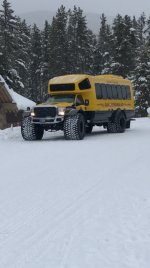https://bobistheoilguy.com/forums/ubbthreads.php/topics/1176830/Re:_What_stops_better_on_ice said:
Wide, smooth tires of the proper compound for the conditions work better on common hard, dry road surfaces because with a relatively constant amount of friction per unit area you'll end up with more friction with a larger area. With wet surfaces or with snow and ice that has the potential for creating wet surfaces you need adequate load to break the water film between tire and road. With a large enough contact patch for the load you can glide easily on water, which is what some people like to do at the beach with 'skim boards'.
So, wide smooth tires don't 'fail gracefully' when confronting water. Grooves and lugs in tires create tread blocks to displace water and create higher loads per unit area, and siping is often needed when the tread block contacts the road. An example is with mud tires with large smooth tread blocks as it can do well in snow but on ice they can be just slightly better than slicks. As it gets colder traction on ice increases, but since you know that eventually water will form on the surface you want to be careful about too large of a contact patch.



